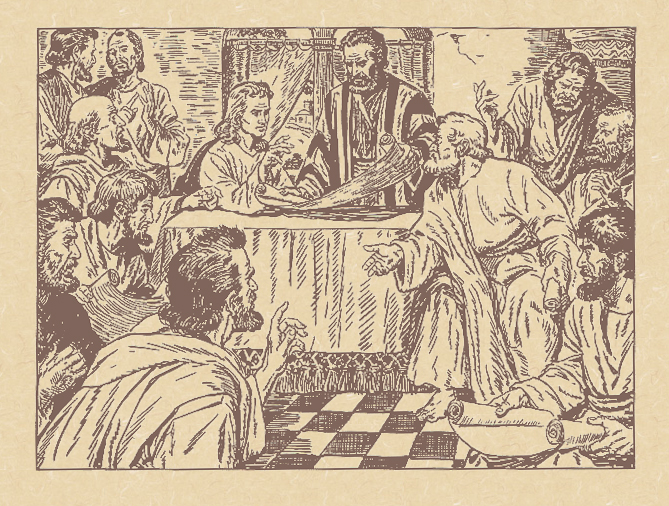Nothing to Add.
The Fifth Thursday of Easter.
Lessons from the feria, according to the ordinary form of the Roman Rite:
• Acts 15: 7-21.
• Psalm 96: 1-3, 10.
• John 15: 9-11.
The Fourth Thursday after Easter.*
Lessons from the dominica,** according to the extraordinary form of the Roman Rite:
• James 1: 17-21.
• [The Gradual is omitted.]
• John 16: 5-14.
FatherVenditti.com
|
8:43 AM 5/23/2019 — As you know, during this season we’ve been enjoying the saga being played out in the first lessons from Saint Luke's Acts of the Apostles: Paul, following his conversion to the Faith, laboring among the Gentiles, joined by Barnabas, making converts throughout the sophisticated cities of the Greek world, then having to return to them later because Jewish Christians from Jerusalem—some convinced that one had to first be a Jew to be a Christian, some simply jealous because Paul's own sophisticated education made him an effective Apostle to the Greeks—were following them into these cities to try and undo what Paul and Barnabas had accomplished. As we read of these events, we may find ourselves amazed at how Christians, even ones who had known our Blessed Lord personally, could be so infected with jealousy to actually try and stop the spread the Gospel because it was not they, themselves, who were doing it.
Paul, Barnabas and a few of the converts they had baptized into the Church, travel to Jerusalem to present their case to Peter, the first Pope, for what they hoped would be a final decision on their activities, and they win their case, as illustrated in today’s first lesson in which Peter hands down his decision;  but, as we know, that didn't stop the problem, which is part of the reason for the many letters that Paul would write to these cities, preserved for us in the New Testament, as time and time again he had to battle against his own coreligionists who, for one reason or another, actually tried to stop the spread of the Gospel in the name—so they believed—of our Blessed Lord. but, as we know, that didn't stop the problem, which is part of the reason for the many letters that Paul would write to these cities, preserved for us in the New Testament, as time and time again he had to battle against his own coreligionists who, for one reason or another, actually tried to stop the spread of the Gospel in the name—so they believed—of our Blessed Lord.
How often has this saga been reproduced, in microcosm, in our own sight, when friends or relatives who have known each other for years end up stabbing each other in the back for what, in retrospect, turn out to be the most trivial of reasons? We've all seen it, and it's a fare bet that most of us have actually participated in it at some point in our lives. We know it's wrong, and so often we mention it in confession, but that doesn't stop us from falling back into these uncharitable ways time and time again.
It gives a rather cabollistic intensity to the words of our Lord in today's Gospel lesson: “You will live on in my love, if you keep my commandments…” (John 15: 10 Knox). Notice carefully the choice of words: Our Lord does not suggest that His love is conditional;—He doesn’t say, “I will not love you if you don’t keep the commandments—what He says is, “If you don’t keep the commandments, even My love isn’t going to do you any good.” Why? Because grace requires a receptacle that’s worthy enough to contain it. That’s why someone not in the State of Grace who receives Holy Communion doesn’t derive any benefit from it.
So, simply put, the Scripture lessons of today’s Mass pretty much sum up the two-fold responsibilities of Christian living: to keep ourselves free from sin and to practice charity towards others. I can’t think of a single thing we can add to that, other than for us to acknowledge how often we find ourselves lacking in both. All the more reason for us to take the Post-Communion prayer of today’s Mass and make it our own:
Graciously be present to your people, we pray, O Lord, and lead those you have imbued with heavenly mysteries to pass from former ways to newness of life.

* In the Missal of St. John XXIII, the Fourth Sunday after Easter means the fourth after the Octave, in effect the fifth of the Easter Season.
** In the extraordinary form, on ferias outside privileged seasons, the lessons from the previous Sunday are repeated.
|

